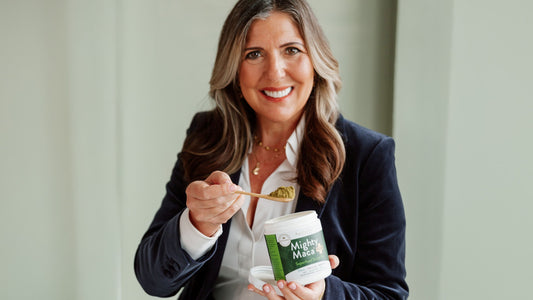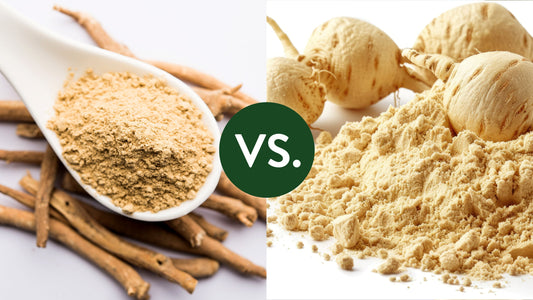Vaginal dryness and menopause. Unfortunately, it seems like these two things go together like veggies and olive oil. But why? What causes this phenomenon? And most importantly, how do you put a stop to it? Because living with dry, thinning, itchy tissues down there just isn’t a viable option.
After all, your body was designed to go through menopause. It just needs some proper support to make the transition a bit more comfortable.
Let’s dive into the full story behind vaginal dryness, why it crops up in menopause like an unwanted guest, and how you can stop vaginal dryness.

First off, let’s talk about exactly what vaginal dryness is.
Technically, vaginal dryness stems from what we gynecologists refer to as atrophic vaginitis or more simply vaginal atrophy or vulvovaginal atrophy. (1) The newer term for this condition is genitourinary syndrome of menopause. Essentially, all of these terms mean the same thing. (2)
Symptoms of vaginal atrophy or vaginal dryness may include (3):
- Irritation
- Bleeding
- Redness
- Painful sex
- Vaginal dryness
- Painful urination
- Burning sensation
- Bleeding after sex
- Itchy vulva tissues
- Increased need to urinate
- Recurring urinary tract infections
- A shortening or tightening of the vagina
Yes, these vaginal atrophy symptoms can completely disrupt your life. They can certainly bring your sex life to a halt. And they are painful, uncomfortable, and can lead to a significant decrease in quality of life.
If you’re nodding your head, keep reading. I’m going into all the details when it comes to vaginal dryness and menopause — including how to stop it from ruining your life!

Yes, vaginal dryness causes itching. So if you’ve been feeling itchy in your vagina (the inside) or on your vulva (the outside), vaginal dryness could be to blame.
In my gynecology practice, I often saw women that assumed they had a vaginal yeast infection because they felt so itchy down there. They’d be running to the drugstore to stock up on antifungals but not getting any relief. This itching could be due to vaginal dryness, and not a yeast infection. Of course, itching could also be the symptom of a sexually transmitted infection or bacterial vaginosis, so be sure to check in with your doctor if you’re feeling itchy down there.
Can Vaginal Dryness Cause Pain?
Vaginal dryness absolutely causes pain. Your tissues that were once moist and lubricated are suddenly all dried up. Normal, everyday friction from your underwear or toilet paper can cause unbearable pain and discomfort. Activities like running or riding a bike might be totally off the table. You may feel like you’ve got to toss your favorite leggings or jeans into the donation pile.
And when it comes to sex, a dry vagina is not a happy vagina. Women experiencing vaginal dryness often endure pain during sex and yes, that means vaginal dryness can cause bleeding — especially after sex. The vaginal tissues are so dry and thin that they crack and bleed due to the friction.
What Causes Vaginal Dryness?
So, now we know what vaginal dryness is. But what causes it?
The main culprit: dropping estrogen levels due to menopause.
Some of the other vaginal dryness causes include (4):
- Exposure to endocrine-disrupting chemicals in your beauty care products
- Cancer treatments
- Hysterectomy
- Dehydration
- Childbirth
- Breastfeeding
- Certain medications like Depo-Provera or Lupron
Vaginal Dryness And Menopause
Vaginal dryness during menopause and perimenopause is one of the most common symptoms of menopause. So if you’re dealing with this frustrating aspect of the change, take heart. You are not alone.
And you’re also not without options. Keep reading for ways to deal with vaginal dryness.
How To Treat Vaginal Dryness
Your vulva and vagina are very vascular. That means they absorb what you put on them into your bloodstream easily. So you have to be careful about what kind of products you use down there.
And your vulva and vagina are also extremely sensitive. So you can’t just start slathering on any moisturizer off the drugstore shelf to relieve vaginal dryness.
But what helps with dryness down there? What’s a good vaginal atrophy natural treatment?
I’m glad you asked, because even though I’ve talked at length about some of my favorite vaginal dryness natural remedies over the years, I can always shed more light on the ways to treat vaginal dryness.
Girlfriend, you don’t have to live with feeling less than juicy down there. Just follow these 3 tips and you’ll be on your way to wearing those favorite jeans and loving your sex life again, I promise.

1. Keep Your Vaginal Tissues Lubricated
Even though you can’t just use any old moisturizer on your delicate vulvovaginal tissues, you definitely do want to use a gentle, natural moisturizer on the skin down there when it starts feeling dry.
Some of my favorite vaginal-safe moisturizers include coconut oil, shea butter, vitamin E, and emu oil. Emu oil is really interesting because its’ tiny particles could help support healthy inflammation and make irritated skin feel happy again. (5-7)
If you don’t have the time, energy, or inclination to make your own natural lube, consider using my new (2025) gynecologist—formulated lubricant, Velvé. I designed it to provide immediate, short-term relief—and pleasure—during intercourse and other intimate activities. It’s especially formulated for menopausal and postmenopausal women.
For a quick and easy DIY natural lube check out this article.

2. Support Estrogen Levels
One of the key reasons you experience vaginal dryness in menopause is because your estrogen levels are dropping. Your vulvovaginal tissues rely on estrogen to stay plump and hydrated. So when estrogen gets taken away from them, they thin out and become drier.
This is why it’s key to make sure you’re supporting natural estrogen in the body. For this, some women use treatments that contain estrogen. These treatments aren’t always appropriate for everyone though, especially anyone who’s had a stroke, liver disease, or breast cancer. (8)
Dehydroepiandrosterone (DHEA) is a hormone that’s naturally occurring in the body, and is a precursor to both estrogen and testosterone. Some women find that topical DHEA is a more attractive alternative to estrogen creams for vaginal dryness.

3. Let’s Talk About Inflammation
Once your vulvovaginal tissues become dry and irritated, they become more inflamed. And when you’ve already got inflammation in your body, this can lead to a never-ending cycle of more inflammation.
It’s super important to support healthy levels of inflammation in your body. When you’re taking care of yourself from the inside, the outside tends to follow suit. That means eating lots of yummy alkaline foods and getting in plenty of exercise so your body can work with you, instead of against you when it comes to ending vaginal dryness.
Julva® to Revitalize your Vulva and Vagina
Even though menopause and vaginal dryness go hand-in-hand, that doesn’t mean you’re destined to live with pain and discomfort down there.
I’ve known far too many women who struggled with vaginal dryness and dry, thinning vulvar tissues for far too long because they didn’t want to use messy, uncomfortable-to-insert suppositories or creams containing estrogens. Plus, it’s really hard to find a vaginal dryness cream that doesn’t contain questionable ingredients like parabens or phthalates.
And that’s exactly why I developed my (now patented!) Julva®.
It’s literally a moisture-infused makeover for your entire vulva and vagina. Just a small application to your vulvar tissues and clitoris daily for one month could mean a huge difference in how you feel down there. Seriously, women rave about Julva® and call it the “best cream for vaginal dryness!”
Oh, and since it contains DHEA, it can also give you a boost in the libido department, too.
References
- https://www.ncbi.nlm.nih.gov/books/NBK564341/
- https://www.ncbi.nlm.nih.gov/pmc/articles/PMC4561742
- https://www.ncbi.nlm.nih.gov/books/NBK559297
- https://www.uptodate.com/contents/vaginal-dryness-beyond-the-basics
- https://pubmed.ncbi.nlm.nih.gov/17694361/
- https://www.ncbi.nlm.nih.gov/pmc/articles/PMC3818616/
- https://pubmed.ncbi.nlm.nih.gov/25441585/
- https://www.pfizermedicalinformation.com/en-us/premarin-vaginal-cream/contradictions




